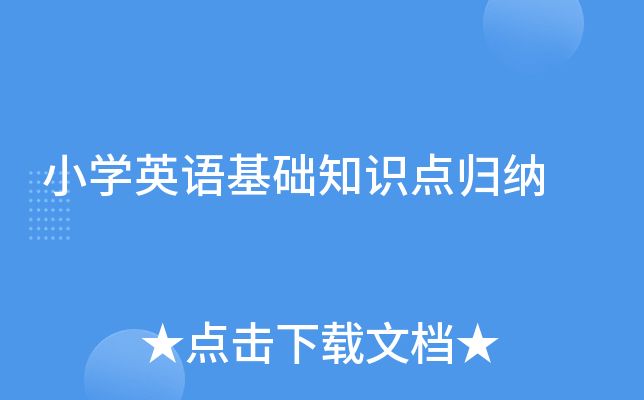1.小开云kaiyun(中国)英语基础知识点归纳 篇一
1、vocabulary单词:morning 早上 afternoon 下午 hello 你好 look看一看 say说
see看见 you 你 I(me) 我
2、Daily expression 日常用语:
(1)Hello!Hi !
(2).Good morning
(3) Good afternoon
(4)Goodbye
(5)Nice to see you.(见到你真高兴)
3、Grammar语法:
(1)I (代词pronoun)
(2) I’m.......(be动词---am) 注意与is的不同场合下使用
拓展:----Nice to meet you.见到你真高兴 ----Nice to meet you.too见到你真高兴
2.小开云kaiyun(中国)英语基础知识点归纳 篇二
一般现在时:通常用 "usually, often, every day, sometimes"。
肯定句:
I go to school on foot every day.
She goes to school on foot every day.
一般疑问句:
Do you jump high? Yes, I do. / No, I don't.
Does he jump high? Yes, he does. / No, he doesn't.
否定句:
We don't go to school on Sundays.
My mother doesn't like watching TV in the evening.
3.小开云kaiyun(中国)英语基础知识点归纳 篇三
特殊疑问句。表示疑问,有疑问词(在开头),回答有很多种可能。
常用疑问词:
What、When、Which、Who、Whose、Why、How
如何对划线部分提问:
1、将原问句翻译为汉语(在读中要将划线部分重读)。
如:His birthday is on the 5th of May .
他的生日在五月五日。
2、用汉语进行提问。
如上句,应该问:他的生日在什么时候?
3、根据汉语将所要提问的句子补充完整。
如上句When is his birthday ?
4.小开云kaiyun(中国)英语基础知识点归纳 篇四
一、现在进行时用法主语在句首,am is are 跟在后,
现在分词跟着走,其他成分不可丢。
表示动作正进行,句中now时间定。
一般问句,把be提到句前去。
否定句式也简单,be后只把not添。
二、特殊疑问句用法。
What用途广,要问“什么”它当先。(What's this?)
How开头来“问安”。(How are you?)
Who 问“谁”。(Who's that man?)
“谁的”Whose来承担。(Whose eraser is this?)
询问“某地”用Where。(Where is her cat?)
“哪一个”which句首站。(which one?)
三、动词加-s或-es方法歌诀
动词三单现在式,一般词尾加-s。
s,x,ch,sh在词尾,直接加上-es。
词尾若是字母o,加上-es不用愁。
“辅音字母+y”来结尾,变y为i是正规。
-es后边紧跟随,study——studies看明白。
四、“be going to”的用法口诀
be going to,表打算,准备、计划将干。
表可能,有必然,通过现象来推断。
使用它,要注意,疑问形式be提前。
否定句,更简单,not放在be后边。
to之后,动原型,be的形式看人称。
下列词,要注意,come go 和离去(leave)
进行时,表将来,牢牢记住莫忘记。
5.小开云kaiyun(中国)英语基础知识点归纳 篇五
1. 字母:(大小)辨认、书写顺序;元音字母:Aa , Ee, Ii, Oo, Uu2. 数字:1~999的基数词和序数词的运用,如计算、购物、时间、日期等。
句型:
①What's your number?
②What's the time?
③How many pens are there?
④How old are you?
⑤How much is it?
⑥How tall are you?
⑦How heavy are you?
⑧What time do you get up?
⑨When's your birthday?
⑩What time did you see him?
3. 颜色:单词:red, pink, yellow, brown, blue, purple, orange, black, white, green.
句型:
①What colour is it?
②What's your favourite colour?
4. 时间:年、季节、月、星期、日、时刻: Season (spring, summer, autumn, winter)
Month: January, February, March, April, May, June, July, August, September, October, November, December. Week: Sunday, Monday, Tuesday, Wednesday, Thursday, Friday, Saturday.
Day: 1st May (the first of May), May 2nd (May the second) 句型:见话题2。
5. 食品与饮料:人对食品与饮料的喜好;东西方食品。
句型:
①I like biscuits.
②I'd like a cold drink.
③Would you like some buns?
④Do you want some rice?
⑤This isn't my food.


